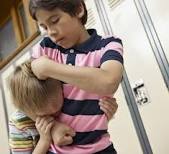Blog Archives
Funeral Footwork
Posted by JF
Now that things have settled down just a bit, perhaps I can get back to blogging.
My family and I traveled out of state to my father-in-law’s funeral during my last hiatus. I have posted before about the experience of attending a funeral from an aspie standpoint before, so I already knew I was in for a slightly uncomfortable time. However, I was also very aware that I was going to have a very important job at this funeral – my FIL’s death hit my wife pretty hard. She handled it surprisingly well, but she was still emotional. I was there to support her, because aspies are superheroes when it comes to lending support during emotional times.
Able to not understand what the big deal is in a single shrug.
There were times where I found myself standing around with nothing to do, so I started doing what I enjoy doing in these types of situations: I began to observe human behavior for interesting patterns. It didn’t take me too long to find one. I started noticing how people were standing and talking together. I noticed that when two people stood together, they almost never faced each other. They stood with their feet at an angle to the other person, like a conversation deflection of sorts – I’m not really interested in talking to you, but I don’t want to seem rude and ignore you, so I’ll meet you halfway. It was pretty consistent no matter the age or gender.
I decided that I needed to learn this move, post haste.
Even more interesting was how this dynamic applied when there were more than two people standing together. The “angled feet” behavior was still present, with each person angling themselves to avoid directly facing either of the other people. And as the group grew, the people adjusted their angles to fit the group’s size, often positioning themselves to form a social semicircle.
It was fascinating. Seriously. I felt like Pavlov, only my subjects weren’t drooling dogs.
And my beard wasn’t quite as bitchin’.
The most interesting thing happened when…
Wait a minute…
That’s totally Robert Duvall with a humongous beard!
Ok, where was I? Oh yeah…
The most interesting thing happened when two groups came together to form a large “supergroup” of sorts. Each group would open up slightly to accept the merging group, and after a moment or two of jostling, the people would fall perfectly into the angled feet position! The supergroup would often be a fairly large circle at this point, with nobody talking or looking directly at anyone else, yet they were all having a conversation with everyone at the same time.
Amazing!
From here, the supergroup would break up and the participants would float around the room until they joined up with others to form smaller group chains. And this dynamic happened over and over again. It was like watching so weird social cellular cosmos, with people aimlessly colliding with one another over and over again. It was cool to watch. It was even cooler not to join in. Instead, in between consoling hugs for my wife, I was able to let my mind wander onto other meaningless things. Such as….
See? Didn’t I tell you?
Posted in Aspergers, My Life, Social Anxiety, Uncategorized
Tags: antisocial, Aspergers, Aspie, awareness, behavior, conversation, death, emotions, family, friends, funeral, pavlov, robert duvall, small talk, social, Social Anxiety, uncomfortable
Autism and Bullying
Posted by JF
Bullying seems to be a hot topic nowadays. I’m not sure why all of a sudden EVERYBODY is all up in arms about this. It’s not like bullying is something new that kids just came up with this year, like listening to crap music like Lorde. Bullying has been around for quite a while. The first recorded use of the word “bully” occurred in 1530 (yes, I looked it up; I don’t spend all day making up fake facts for this blog, I’ll have you know), but the concept goes back way before that. There were even bullies in the Bible, for Christ’s sake.
Jesus likes!
Because of the nature of bullying behaviors, children on the autism spectrum at at a higher risk of being victims of bullying. Bullies often single out those who are weak or socially outcast and make an example of them. It’s not always about physical violence. The main motivation is an attempt by the bully to feel superior to others and to be looked at as being in a position of power. Due to the characteristics of autism (weak sensory perception, social awkwardness, etc.), children with autism or aspergers are juicy targets for the bully to get what he or she wants.
A parent of a child with special needs is then faced with a difficult situation. Very often, children with autism will have difficulty communitcating to the parents that they are being bullied. The emotions that come with being pushed around are hard to understand; the child may claim to feel sad, tired, or simply hide their feelings in order to avoid them. It is the parents’ job to keep an keen eye on the child’s temperment and watch for any changes that may indicate that something is wrong.
Or just outsource the job to the Chinese.
Bullies prey on fear; they count on their targets being to afraid to report them or do anything about it. Children with autism are already scared and anxious to begin with. A bully doesn’t even have to work hard to intimidate these kids; half the job is already done for them.
Another reason why it may be hard for parents to detect when their child is being bullied is that the child may not even realize that they are being mistreated. To children with social deficits, a bully may seem like a friend. After all, it’s someone who is talking to them and giving them attention. That’s a friend, right? Doesn’t matter if that the “friend” is taking their stuff, slugging them in the arm, and calling them names behind their back. That must be what friends do!
“Mom! Tommy and I are gonna go play ‘Get Beat Up By Tommy!’ “
Now, it’s clear that special needs children are especially vulnerable to bullying. However, all of you special needs parents shouldn’t jump up on your high horse and think your child will always and forever be free of blame when it comes to bullying. Remember all of that anxiety and fear I was talking about before? Well, a funny thing about those negative emotions – they tend to send you child’s self esteem crashing faster than Healthcare.gov.
Obama no likes.
These drops in self esteem can lead to children with special needs becomingthe bully. If the child has trouble understanding how to address social situations, the chance of inappropriate behaviors evolving into bullying is higher. We can’t just look at our children as wonderful little angels and allow ourselves to be blind to the other side of the coin. If you don’t want you child to be bullied, you have a responsibility to make sure your child doesn’t turn into one.
It’s clear that bullying is a critical subject that should be discussed with our children. We need to teach our children to be respectful of one another no matter what the situation. Remember, kids grow up to be people; the last thing you want to be responsible for is letting you kids turn into assholes when they are older.
Posted in Uncategorized
Tags: anger, antisocial, anxiety, Aspergers, Aspie, Autism, awkward, bully, bullying, emotions, fear, friends, parenting, self esteem, Social Anxiety, spectrum, stress
Family Business
Posted by JF
Today I found myself wondering about my parents. Specifically, I was considering the possibility of either one of my parents having Aspergers. It’s common knowledge that Aspergers and autism seems to run in families. Could either of my parents have been an aspie?
When measuring the possibility of mental disorder, my mother comes to mind first. I love her to death, but I’m not going to deny that she is kinda nutty. She does possess some aspie-like traits: she is ritualistic, slow to adapt to change, and fairly antisocial. One thing that doesn’t fit, however, is her expression of emotions – if anything, she is OVERexpressive. Last time I visited, she got upset and tried to console me when I dropped an egg on the kitchen floor.
The funeral procession for the embryo was not at all necessary.
She might have OCD tendencies, she might not be a social butterfly, but I don’t think she has Aspergers. My father, on the other hand…
I’ve brought up the possibility of my dad having Aspergers to my wife before, and she has easily dismissed the idea in the past. “He had a good sense of humor, he was very sarcastic,” she says. “Aspies aren’t usually good with sarcasm.”
First off: Aspies can be good using sarcasm. I use it all the time. The problem aspies have with sarcasm is detecting it in others, not using it themselves.
Second: I don’t think she quite understands what made my dad so funny. The reason he was hilarious was because he would “act” serious when doing something completely crazy that nobody would ever expect. One example I always love to use is how he used to openly discuss his tipping plans with the waiter while the meal was still underway. My family thought it was so funny, how he would joke around like that.
The waiters found it hilarious.
What if he wasn’t joking? What if he just had no clue that that’s something that you aren’t supposed to do? Social awkwardness – check.
Another thing about my dad – I only remember seeing him cry once, when my mom was very sick and was hospitalized. Other than that? I don’t recall him showing many emotions at all. Home movies of us show him basically being there, every once in a while telling us kids to quit doing annoying things. I know he loved me, but do I have any concrete evidence showing an emotional bond between the two of us? Inability to outwardly express emotions – check.
There are other reasons that I won’t get into here, but what it boils down to is that there is a decent chance that my dad has Aspergers. Then, of course, I got to thinking…
What in God’s holy name were they thinking when they came up with this?
Then I got to thinking…
Hey, wait a minute… what DOES the fox say???
But then I started thinking…
I have some unresolved issues with my dad (I was not aware of them until after he died). Do I really want my son to have those same issues with me when he gets older? Of course not. So I make sure that he knows I love him, every single day. I do more than tell him – I show him. I show him by being there for him when he needs me, by being there when he doesn’t, by being engaged with him even when he tells stories that take ten minutes and six run on sentences to complete. I don’t want him to have to question whether or not his father loved him. I’m going to make that answer obvious for him.
And you know what? It’s EASY. My kids are part of a very small group of people in this world who I feel completely comfortable being real around, and connecting truly with. He may realize when he grows up that Daddy was a little strange, but he’ll never feel disconnected from me. I won’t let that happen.
Posted in Uncategorized
Tags: antisocial, Aspergers, Aspie, awareness, connection, emotion, emotions, family, father, funny, humor, parenting, sarcasm, son
Ignorance is NOT Bliss
Posted by JF
A conversation on Twitter earlier today brought up an interesting point about my aspie traits – my ability to handle bad news compared to my inability to not know what’s going on. Most people would rather not know about something bad that happened so they can go about their day without being affected by the events. Not me.
First of all, I’m hardly ever deeply affected by things that don’t directly involve me. It may seem callous and cold to say that, but seriously… have you read any of my other posts? It’s clear that Aspergers causes me to be somewhat self involved and gives me some emotional insulation from the rest of the world.
Hey, what can I say? I’m the King of I Don’t Give a Shit.
Secondly, I can’t just not know what’s going on. In fact, once I’m alerted to something going on, I MUST know what’s up. It’s my thirst for knowledge – there can’t be something that somebody knows that I don’t know about. Or at least I have to be able to make a decision about whether it’s worth my time to investigate. Saying “nevermind” or “don’t worry about it” to me is the same as saying “you’re going to obsess over what I’m not telling you about for the next three days or until you find out exactly what it is I’m hiding from you.”
Posted in Uncategorized
Tags: Aspergers, Aspie, emotions, frustration, internet, obsession, obsessive, twitter















